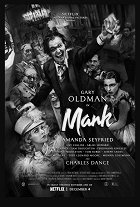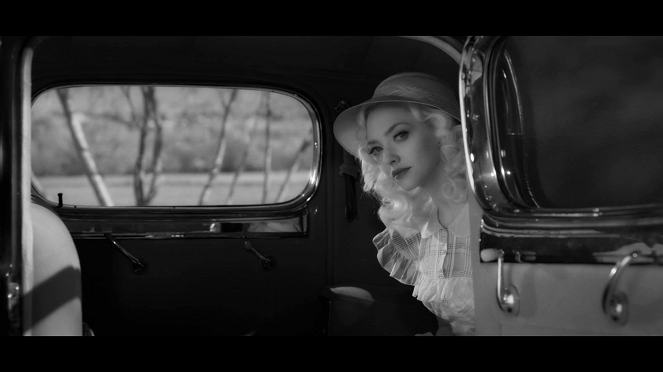Directed by:
David FincherScreenplay:
Jack FincherCinematography:
Erik MesserschmidtCast:
Gary Oldman, Amanda Seyfried, Lily Collins, Charles Dance, Tom Burke, Joseph Cross, Tuppence Middleton, Leven Rambin, Tom Pelphrey, Arliss Howard (more)VOD (1)
Plots(1)
1930s Hollywood is reevaluated through the eyes of scathing wit and alcoholic screenwriter Herman J. Mankiewicz as he races to finish Citizen Kane. (Netflix)
Videos (2)
Reviews (14)
A formally precise and linguistically exquisite picture about the writing of the screenplay for Citizen Kane. Unfortunately, apart from context of that period, it offers nothing new. Filming according to his father’s screenplay, Fincher nurtured all aspects of this heart-felt project and the way he presents the topic in the style of a forties movie is very appropriate. You can’t tell the difference. The actors are great down to the last one. The music is perfect: Reznor and Russ are brutally moderate, obediently serving the story. But it was strange to listen to Trent’s typical piano playing in a movie that clearly must have been filmed eighty years ago...
()
In the first minutes, if not seconds, I was amazed by how Mank looks - truly like it was filmed 80 years ago, a beautifully restored film that made it to Netflix this year (and, sadly, not to movie theatres where it REALLY deserves to be). The best part is that the amazement didn't leave me by the end of the film, and it is also great in terms of the script, the actors (Gary Oldman is even better than you think), actresses (the magical Amanda Seyfried and Lily Collins) and music (untypical but excellent Reznor and Ross). If you don't want to watch Citizen Kane before Mank, then after Mank you will. And then you'll probably watch Mank again.
()
"WhY dOEsN’t FiNCher MaKe aNoTHeR Se7en?!?§" the movie. A work hardly applicable in a non-American environment (god, just the idea that it has Czech dubbing or subtitles in the usual Netflix quality), for which one can't be mad at Jarmila Střížkova here for absolutely not knowing where its head is at. In our confines, then, it's mainly a problem that among the mainstream cashless-market critics, there is no one who has the will to interpret and articulate the film to the local viewer, used to boredly clicking through the endless Netflix offerings in his sweatpants on the couch to see if there is anything else capable of engaging him. We all laughed at the Spáčilová until we discovered that there never was a Spáčilová, it was always just us. The absence of Mank from theaters is one of the most unfortunate things to happen this year.
()
This year, David Fincher gave me an early Christmas present in the form of a 100% movie-lover experience, thanks to which I was lost for two hours in the Hollywood machinery and political jungle of the end of the 1930s and start of the 1940s. Jack Fincher's screenplay flows harmoniously like a poem and there are strong intense speeches from the characters that I haven't heard in a movie for a long time. Cult movie making maybe, but absolutely breathtaking and shot right from the heart!
()
Mank attracts viewers primarily through its unraveling of the tangle of influences that led the title character, an alcoholic screenwriter, to write the celebrated Citizen Kane. However, the actual writing of that screenplay plays second or rather third fiddle in Mank, as there is no depiction of the classic’s shooting, the great Tom Burke as Orson Welles appears on screen for a total of maybe three minutes, and Mank isn’t very faithful to the historical facts; for example, it presents Welles’s involvement in the drafting of the screenplay in accordance with myths that have long since been debunked. In fact, Mank is rather generally focused on the workings of Hollywood in the 1930s and during the Great Depression, and to roughly the same extent it deals with the political mood of the time and the affair involving the 1934 California gubernatorial race, which is understandably not much of a draw for viewers. But that’s not the problem. Rather, the problem is that none of this is rendered in a very engaging way. Though I fully understand Fincher’s desire to make a film based on his father’s long-shelved screenplay, that screenplay is unfortunately about uninterestingly written and poorly defined characters who frequently deliver witty and precisely aimed lines, but what good is that when there is no one to build any kind of relationship with on the screen? Furthermore, the second half of the film fundamentally loses traction and, with the exception of a drunken scene at a fancy-dress dinner party, it doesn’t contain much that’s remarkable. Tim Burton's Ed Wood, for example, was made with a similar intention and turned out much better. Mank is also related to Citizen Kane in its attempt at an audio-visual retro-form, which, though impressive, is not in any way consistent (after all, it was shot in widescreen digital), with a complicated narrative structure full of flashbacks (which are rather oddly skipped between in places) and a lot of different allusions (visual quotes, references to sleds and rosebuds, for example). Therefore, it is definitely necessary to see Citizen Kane before watching Mank. And though it’s fortunately not entirely necessary, it helps to know something about the key figures of Hollywood society at the time.
()



Ads